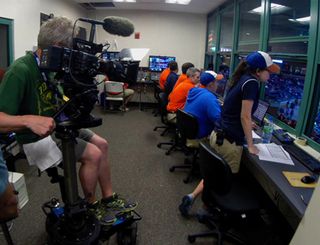Stations That Go Long? It’s a Short List

While the fruits of its nascent program won’t be seen for a couple years, KOMU Columbia (Missouri) has access to a pipeline of in-depth and rich local stories that no one else in the market can likely generate. That’s because the station has a unique new corporate sibling with a familiar face running the show: a documentary journalism department headed up by Stacey Woelfel, who oversaw the KOMU newsroom from 1990 until taking on his new post in September.
The University of Missouri owns KOMU, an NBC affiliate, while the Jonathan Murray Documentary Journalism Center—seeded with $6.7 million from television producer Murray (cocreator of MTV’s The Real World)—is part of the university’s journalism school. Documentary filmmaker Robert Greene is on board to begin teaching in August 2015. Twenty undergrads will start in the program, the number growing to around 50 in a few years’ time.
While the documentary unit is not part of the TV station, the students’ work will likely run on KOMU when appropriate. “Obviously I know people over there,” says Woelfel. “They are open to that and will see if something is a good fit for their audience.”
Across the country, Woelfel’s old Mizzou mate, Jay Jennings, is hard at work in the bustling documentary department at WRAL Raleigh-Durham—one of the exceedingly rare station-level documentary units in the U.S. WRAL is at work on its sixth documentary this year, on domestic violence in DMA No. 25. Jennings is the department photographer, and Clay Johnson is producer and writer.
Jennings is hard pressed to name another station-level documentary unit. “It really, really all goes back to Jim Goodmon,” he says of the Capitol Broadcasting president and CEO. “He’s absolutely dedicated to local television being a benefit to the community, and he sees documentaries as part of that.”
While the public broadcasters are known for standout long-form work, such as WGBH’s influential Frontline, commercial station documentaries are typically stitched together from an investigative series, as opposed to being hatched fully formed from a dedicated unit. Hearst Television’s WCVB Boston, for one, has a well-staffed team for its Chronicle series, which airs 7:30 p.m. Monday through Saturday.
But the dedicated station docu unit is an almost extinct breed. “Unfortunately those days are gone,” says Steve Schwaid, former news director and VP of digital strategy at consulting firm CJ&N. “The pressure on revenue and on costs is so high that it gets really difficult for a public company to do them.”
Broadcasting & Cable Newsletter
The smarter way to stay on top of broadcasting and cable industry. Sign up below
WRAL’s documentaries, typically running 30 minutes (one, on a wrongfully imprisoned man, ran 90 minutes) and airing at 7 p.m., range from the hard-hitting, including ones on child poverty and the Muslim struggle in North Carolina, to the entertaining, such as a special on the Durham Bulls minor league ballclub, which Capitol owns.
Ratings are typically robust, but the documentaries are not about revenue. “It’s what we’re supposed to do as broadcasters—bring important issues to light,” says Steve Hammel, WRAL VP and general manager.
That’s the mission at Mizzou too. Woelfel, former RTDNA chairman, is pumped about the new opportunity—even if he misses some aspects of his former KOMU job. “The big breaking stories,” he says. “I’ll definitely miss being a part of that.”
Michael Malone, senior content producer at B+C/Multichannel News, covers network programming, including entertainment, news and sports on broadcast, cable and streaming; and local broadcast television. He hosts the podcasts Busted Pilot, about what’s new in television, and Series Business, a chat with the creator of a new program, and writes the column “The Watchman.” He joined B+C in 2005. His journalism has also appeared in The New York Times, The Philadelphia Inquirer, Playboy and New York magazine.

